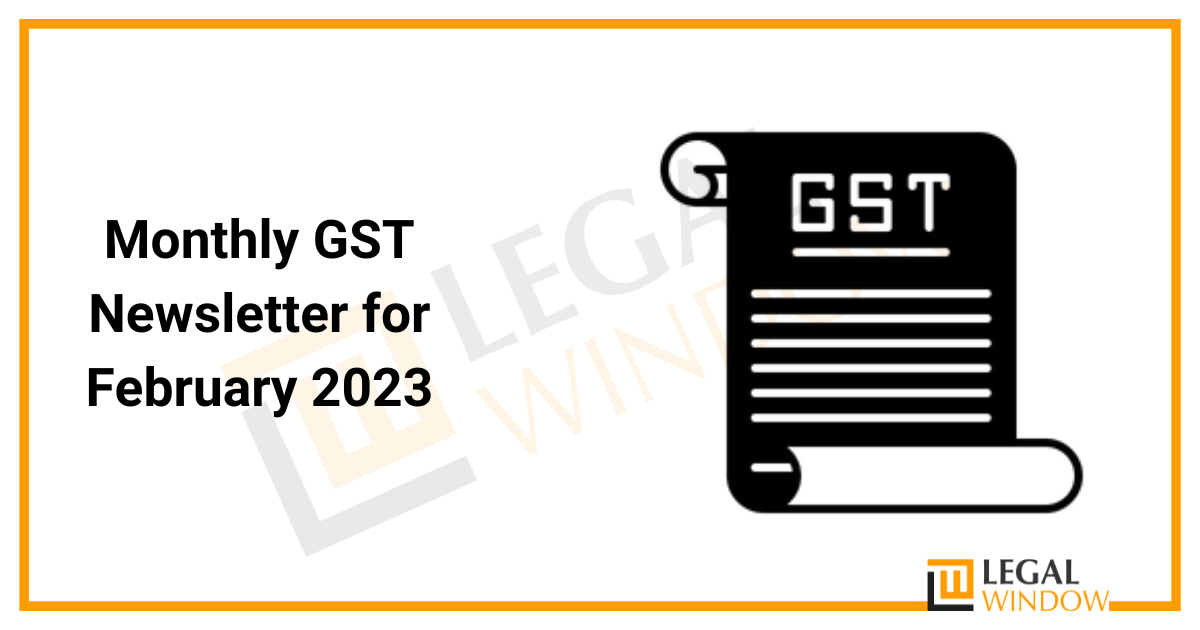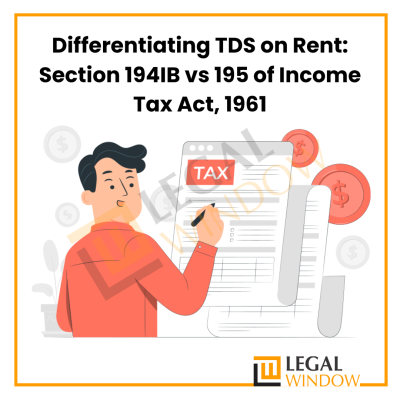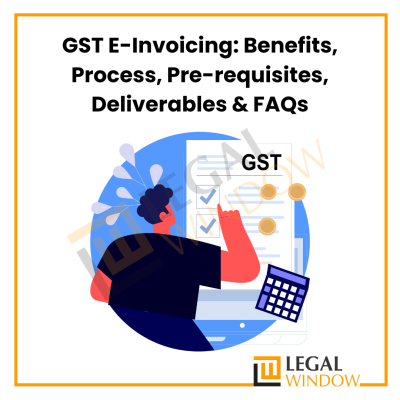
On July 1st, 2017, India implemented the Goods and Services Tax (GST) to unify the country’s indirect tax structure. The Goods and Services Tax (GST) is a value-added tax applied on products and services used in India. It was designed to replace other indirect taxes such as excise duty, service tax, and value-added tax (VAT). In India, any firm, individual, or corporation that supplies goods and services must register for GST. Here, we are going to discuss the Monthly GST Newsletter for February 2023.
| Table of Content |
Overview of the concept of GST in India
GST stands for Goods and Services Tax. It is an indirect tax that was introduced in India on July 1, 2017. GST is a comprehensive tax that has replaced multiple indirect taxes. That were previously levied by the Central and State governments, such as Central Excise duty, Service tax, Value Added Tax (VAT), and others.
GST is a destination-based tax that is levied on the supply of goods and services at each stage of the supply chain.The tax is set on the value-added at each stage of the supply chain, with the ultimate burden falling on the end consumer.
GST has simplified the tax structure in India by eliminating multiple taxes, reducing tax evasion, improving compliance, and promoting ease of doing business. It has also helped in an integration of the Indian economy by providing a common tax platform across all states and Union Territories.
Benefits of GST
GST has several benefits for the Indian economy and its citizens, some of which are:
- Simplification of Tax Structure: GST has replaced multiple indirect taxes levied by the Central and State governments, which has simplified the tax structure. This has made compliance easier and reduced the burden of tax compliance on businesses.
- Increased Tax Base: GST has brought many small businesses and unorganized sectors under the tax net, thereby increasing the tax base.
- Reduction in Tax Evasion: The introduction of GST has helped in reducing tax evasion by eliminating the cascading effect of taxes and by ensuring that taxes are paid at each stage of the supply chain.
- Boost to Exports: GST has made exports more competitive by reducing the cost of production and enabling exporters to claim refunds on the taxes paid on inputs used in exports.
- Promotion of Ease of Doing Business: GST has enabled businesses to register and file taxes online, which has reduced the paperwork and administrative burden.
- Uniform Tax Rates: GST has ensured that tax rates are uniform across the country, thereby promoting the integration of the Indian economy.
- Boost to the GDP: GST has the potential to add 1-2% to the GDP of the country by promoting growth and investment.
Overall, GST has been a game-changer for the Indian economy, and its benefits are expected to accrue in the long term.
Types of GST
There are mainly four types of GST implemented in India:
- CGST (Central Goods and Services Tax) – It is a tax levied by the Central Government on intra-state transactions of goods and services.
- SGST (State Goods and Services Tax) – It is a tax levied by the State Government on intra-state transactions of goods and services.
- IGST (Integrated Goods and Services Tax) – It is a tax levied by the Central Government on inter-state transactions of goods and services.
- UTGST (Union Territory Goods and Services Tax) – It is a tax levied by the Union Territory Government on intra-state transactions of goods and services within Union Territories of India.
The implementation of GST has replaced the previous system of multiple indirect taxes levied by the Central and State Governments, such as VAT, excise duty, service tax, and more. The introduction of GST has simplified the tax structure and made it more transparent for taxpayers.
Who is required to pay GST?
GST (Goods and Services Tax) is a consumption-based tax that is levied on the supply of goods and services in India. Generally, any individual or business that supplies goods or services, with a few exceptions, is required to register for and pay GST.
The following are required to pay GST in India:
- Businesses whose aggregate turnover exceeds Rs. 40 lakhs (Rs. 10 lakhs for NE and hill states) in a financial year.
- Individuals or entities who are involved in the inter-state supply of goods or services.
- E-commerce operators who are involved in the supply of goods or services through their platforms.
- Businesses that are required to pay taxes under the reverse charge mechanism.
- Casual taxable persons and non-resident taxable persons who supply goods or services in India.
- Individuals or entities must deduct TDS (Tax Deducted at Source).
- Input service distributors who distribute credit of GST paid on input services to the units that are eligible for claiming such credit.
However, there are certain exempted goods and services, as well as businesses that are not required to register for and pay GST. It is important to consult with a tax professional or refer to the official GST guidelines to determine if GST registration and payment is required for a particular business or individual.
Documents required for GST Registration
To register for GST in India, the following documents are generally required:
- PAN card of the business
- Aadhaar card of the authorized signatory
- Proof of business registration such as Incorporation Certificate or Partnership Deed
- Bank account statement
- Address proof of the place of business such as rental agreement or utility bills
- Digital Signature
- Photograph of the authorized signatory
For GST return filing, the following documents may be required:
- Sales and purchase invoices
- Receipts and payments vouchers
- Bank statements
- Purchase orders and delivery challans
- Import/export documents (if applicable)
- Input tax credit records
- Stock and inventory records
- GST payment challans
Recent Updates related to GST
The following are the Recent Updates related to GST:
- Updates in the month of February 2023, LUT for 2023-24 enabled on GST Portal: The process of submitting the Letter of Undertaking (LUT) for the financial year 2023-24 is now available on the GST website. Anyone wishing to make zero-rated supplies (exports) without paying GST must submit the LUT annually for each financial year.
- Module-wise new functionalities deployed on the GST Portal for taxpayers: The GST Portal regularly introduces new features for GST stakeholders, covering various aspects such as Registration, Returns, Advance Ruling, Payment, Refund, and Enforcement. Some notable functionality is:
- Registration – automation of drop proceedings for suspended taxpayers upon the issuance of SCN in Form GST REG-17.
- Advance Ruling– allowing unregistered persons to file Advance Ruling Application.
- Enforcement– enabling taxpayers to file Request for Adjournment when responding to a Notice to Summon in Enforcement cases.
Module-wise new functionalities deployed on the GST Portal for taxpayers: Advisory on the facility of “Initiating Drop Proceedings” of Suspended GSTINs due to Non-Filing of Returns
The GSTN has introduced a new feature on the GST Portal called “Automated Drop Proceedings” for GSTINs suspended due to non-filing of returns. This feature is applicable to taxpayers who have filed their pending returns, either six monthly or two quarterly returns. If all the pending returns are filed, the system will automatically drop the proceedings and revoke the suspension. However, if the GSTIN status does not turn ‘ACTIVE’, taxpayers can initiate drop proceedings by clicking on the ‘Initiate Drop Proceeding’ option available in the ‘View Notices and Orders’ section under ‘User Services’. If this is not possible, taxpayers should contact their Jurisdictional Officer for assistance. This new feature applies only to GSTINs suspended after 1st December, 2022.
Advisory on facility of ‘Initiating Drop Proceedings’ of Suspended GSTINs due to Non-filing of Returns :
- Advisory on taxpayers facing problem in filing GSTR-3B who submitted TRAN 1 Form, but did not file it
According to an update from GSTN, some taxpayers who were given the opportunity to file TRAN forms from 1st October to 30th November 2022. It is submitted their forms on the portal but did not file it within the specified time. These taxpayers have not raised any ticket to report any difficulty faced in filing the forms. GSTN has contacted some taxpayers who informed that they do not intend to file the TRAN forms. As a result, these taxpayers are not able to file their GSTR-3B returns since the TRAN filing window has already closed. To resolve this issue, such taxpayers are advised to raise a ticket on the GST Grievance Portal giving consent to reset their unfiled TRAN forms. Once the consent is received, the TRAN forms will be reset. Then the taxpayers will be able to file their GSTR-3B returns.
Advisory on taxpayers facing issue in filing GSTR-3B:
- Necessary amendments proposed in Budget 2023 w.r.t. GST
The government has made several changes to the GST rules for suppliers who sell goods through electronic commerce operators. These changes include allowing such-
- Suppliers to opt for the composition scheme and pay tax along with interest on input tax credit (ITC) that has not been paid to the supplier within 180 days.
- The value of exempt supply for apportionment of credits will now include the sale of warehoused goods to any person before clearance for home consumption.
- ITC on Corporate Social Responsibility (CSR) expenses has been specifically blocked.
- Certain persons exempt from registration for supplying exclusively exempt goods or services or engaged in agriculture will not need to take GST registration.
- Filing of belated GSTR-1/3B/9/9A/8 will not be allowed beyond three years of the due date. Provisional refund will be eligible for provisionally accepted ITC.
- Penal provisions applicable to electronic commerce operators will be introduced in case of contravention of provisions relating to supplies made by unregistered persons or composition taxpayers.
- Certain offences will be decriminalized, and the monetary threshold for launching prosecution will be increased.
- The Schedule III has been amended to give retrospective applicability to certain paragraphs related to high seas sale, supply of warehoused goods before clearance, and supply by endorsement of documents of title before clearance for home consumption.
- There are also amendments to the definition of non-taxable online recipient and online information and database access or retrieval services and the place of supply of services by way of transportation of goods.
- The government will also prescribe the manner for computing interest on delayed refunds and consent-based sharing of information furnished by taxable persons.
Some other Recent Updates regarding GST
-
Introduction of Negative Values in Table 4 of GSTR-3B
-
Advisory on New e-Invoice Portal
-
Advisory on opting for payment of tax under the forward charge mechanism by a Goods Transport Agency (GTA)
Takeaway
Goods and Services Tax (GST) is a consumption-based tax system that was implemented in India on July 1, 2017. It replaced multiple indirect taxes such as excise duty, service tax, VAT, and others, and brought them under a single tax regime. GST has several advantages, such as simplifying the tax structure, reducing the tax burden on consumers, promoting ease of doing business, and increasing tax compliance. It has also helped to eliminate the cascading effect of taxes and reduce the cost of goods and services.
However, there have been some challenges in the implementation of GST, such as technical glitches in the GST network, confusion among taxpayers regarding compliance procedures, and opposition from some sections of society due to the perceived impact on small businesses. Overall, while there has been some teething problems, GST has been a significant step towards creating a uniform tax structure in India. With ongoing reforms and improvements, GST has the potential to bring about long-term benefits to the Indian economy and its citizens.
CA Pulkit Goyal, is a fellow member of the Institute of Chartered Accountants of India (ICAI) having 10 years of experience in the profession of Chartered Accountancy and thorough understanding of the corporate as well as non-corporate entities taxation system. His core area of practice is foreign company taxation which has given him an edge in analytical thinking & executing assignments with a unique perspective. He has worked as a consultant with professionally managed corporates. He has experience of writing in different areas and keep at pace with the latest changes and analyze the different implications of various provisions of the act.
Categories
- Agreement Drafting (23)
- Annual Compliance (11)
- Change in Business (36)
- Company Law (148)
- Compliance (90)
- Digital Banking (3)
- Drug License (3)
- FEMA (17)
- Finance Company (42)
- Foreign Taxation (6)
- FSSAI License/Registration (14)
- GST (120)
- Hallmark Registration (1)
- Income Tax (202)
- Latest News (34)
- Miscellaneous (165)
- NBFC Registration (8)
- NGO (14)
- SEBI Registration (6)
- Section 8 Company (7)
- Start and manage a business (21)
- Startup/ Registration (130)
- Trademark Registration/IPR (40)
Recent Posts
About us
LegalWindow.in is a professional technology driven platform of multidisciplined experts like CA/CS/Lawyers spanning with an aim to provide concrete solution to individuals, start-ups and other business organisation by maximising their growth at an affordable cost.









